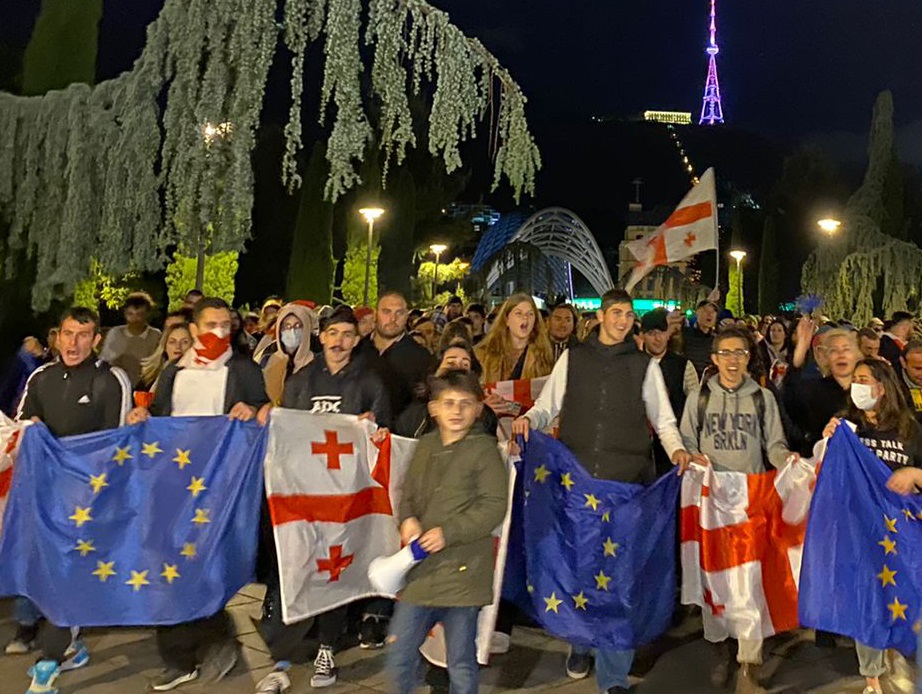The showdown in Tbilisi
Opposition protests continue in Georgia even during the Easter days after the second reading of the law on ‘foreign influences’ was approved. The law is expected to be reviewed by the parliament's legal committee for final confirmation. A situation that risks suspending the country's status as a candidate country for entry into the European Union.
Tbilisi (AsiaNews) - The situation in Georgia is becoming increasingly heated after the second reading approval of the law on ‘foreign influences’, which is provoking reactions inside and outside the Caucasian country. The demonstrations of the opponents have not subsided, blocking the movement on the streets of Tbilisi for days and encountering increasingly violent repression by the police, with numerous victims among the demonstrators and the policemen themselves, which have also provoked the request of some European parliamentarians to suspend Georgia's status as a candidate for entry into the European Union.
The representative of the US State Department, Matthew Miller, intervened to clarify once again the difference between the American Foreign Agents Registration Act (Fara) and the Georgian project ‘On the Transparency of Foreign Influence’. In America, the law concerns ‘persons acting on behalf of foreign governments, not those carrying out their own legitimate NGO activities and dealing with humanitarian aid or representing civil society demands’, Miller explained.
The speaker of the Tbilisi parliament, Šalva Papuašvili, responded on his own Facebook page by criticising the US representative's claims for his ‘superficial assessments’, and pointing out that lobbying companies in the US boast of their support for ex-president Mikhail Saakašvili's family members, such as his mother Gjuli Alasania and the owner of Formula TV, former defence minister David Kezerašvili, both of whom are included in the Fara register. Papuašvili points out that ‘these characters have not acted on behalf of the Tbilisi government for 12 years now’, yet they are not subject to any controls or restrictions by the US authorities.
Opponents of the Georgian law point out that the concept of ‘foreign force’ is practically identical to the Russian definition of ‘foreign agents’, as the leader of the group Strategija Agmašenebeli, Georgij Vašadze, believes that ‘the purpose of this law is the liquidation of public associations and independent media, introducing unsustainable financial punitive measures’.
The law is expected to be reviewed by the parliament's legal committee for final confirmation on 10 May, a fact that has made the opposition suspicious, considering that the day would be a public holiday in connection with Easter. Theoretically, the committee could postpone the law for a third vote in parliament, and this would be seen as yet another ‘trick’ by the Georgian Dream party to fictitiously postpone final approval, and extinguish street protests as happened last year.
This possibility was pointed out by the leader of the Girči party, MP Jago Khvinja, noting the strangeness of the renunciation of a public holiday by those who instituted it: ‘they just want to get rid of the protests of the youth, and in this way the majority becomes hostage to itself and its own convulsive and contradictory strategies, which have no connection with the will of the Georgian people, but at the next elections everything will change’.
The chairman of the legal committee, Anri Okhanašvili, corrected the news by assuring that the re-examination will take place on 13 May; but there are mixed signals from the ruling party on the matter, ‘to disorientate public opinion’, insists Khvinja. Reactions from abroad could create a very divisive scenario, not only distancing Georgia from the EU, but burdening Bidzina Ivanišvili, the leader of the Georgian Dream, along with his other representatives, deputies and family members with new American sanctions.
Public protests did not let up even during the days of Easter celebrations, not only in Tbilisi, but in many cities of Georgia, and a new large rally is announced for 11 May.
Photo: Tabula Media
09/02/2024 10:07
04/10/2021 11:39
02/01/2024 10:00
08/11/2022 12:42







.png)










